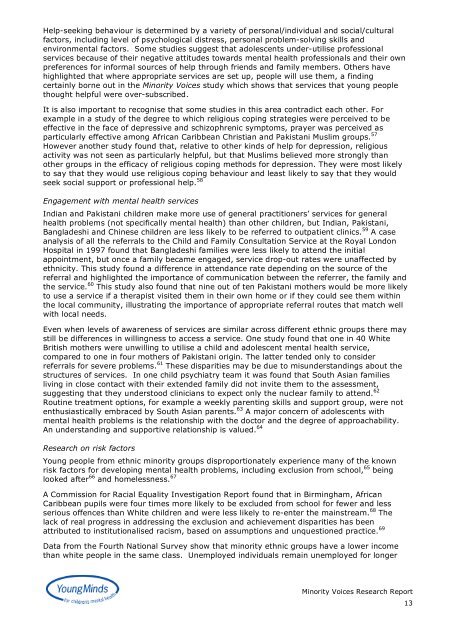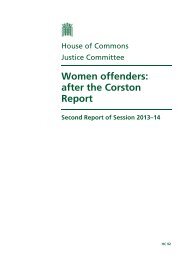Minority voices: Research into the access and acceptability of ... - MMC
Minority voices: Research into the access and acceptability of ... - MMC
Minority voices: Research into the access and acceptability of ... - MMC
- No tags were found...
Create successful ePaper yourself
Turn your PDF publications into a flip-book with our unique Google optimized e-Paper software.
Help-seeking behaviour is determined by a variety <strong>of</strong> personal/individual <strong>and</strong> social/culturalfactors, including level <strong>of</strong> psychological distress, personal problem-solving skills <strong>and</strong>environmental factors. Some studies suggest that adolescents under-utilise pr<strong>of</strong>essionalservices because <strong>of</strong> <strong>the</strong>ir negative attitudes towards mental health pr<strong>of</strong>essionals <strong>and</strong> <strong>the</strong>ir ownpreferences for informal sources <strong>of</strong> help through friends <strong>and</strong> family members. O<strong>the</strong>rs havehighlighted that where appropriate services are set up, people will use <strong>the</strong>m, a findingcertainly borne out in <strong>the</strong> <strong>Minority</strong> Voices study which shows that services that young peoplethought helpful were over-subscribed.It is also important to recognise that some studies in this area contradict each o<strong>the</strong>r. Forexample in a study <strong>of</strong> <strong>the</strong> degree to which religious coping strategies were perceived to beeffective in <strong>the</strong> face <strong>of</strong> depressive <strong>and</strong> schizophrenic symptoms, prayer was perceived asparticularly effective among African Caribbean Christian <strong>and</strong> Pakistani Muslim groups. 57However ano<strong>the</strong>r study found that, relative to o<strong>the</strong>r kinds <strong>of</strong> help for depression, religiousactivity was not seen as particularly helpful, but that Muslims believed more strongly thano<strong>the</strong>r groups in <strong>the</strong> efficacy <strong>of</strong> religious coping methods for depression. They were most likelyto say that <strong>the</strong>y would use religious coping behaviour <strong>and</strong> least likely to say that <strong>the</strong>y wouldseek social support or pr<strong>of</strong>essional help. 58Engagement with mental health servicesIndian <strong>and</strong> Pakistani children make more use <strong>of</strong> general practitioners’ services for generalhealth problems (not specifically mental health) than o<strong>the</strong>r children, but Indian, Pakistani,Bangladeshi <strong>and</strong> Chinese children are less likely to be referred to outpatient clinics. 59 A caseanalysis <strong>of</strong> all <strong>the</strong> referrals to <strong>the</strong> Child <strong>and</strong> Family Consultation Service at <strong>the</strong> Royal LondonHospital in 1997 found that Bangladeshi families were less likely to attend <strong>the</strong> initialappointment, but once a family became engaged, service drop-out rates were unaffected byethnicity. This study found a difference in attendance rate depending on <strong>the</strong> source <strong>of</strong> <strong>the</strong>referral <strong>and</strong> highlighted <strong>the</strong> importance <strong>of</strong> communication between <strong>the</strong> referrer, <strong>the</strong> family <strong>and</strong><strong>the</strong> service. 60 This study also found that nine out <strong>of</strong> ten Pakistani mo<strong>the</strong>rs would be more likelyto use a service if a <strong>the</strong>rapist visited <strong>the</strong>m in <strong>the</strong>ir own home or if <strong>the</strong>y could see <strong>the</strong>m within<strong>the</strong> local community, illustrating <strong>the</strong> importance <strong>of</strong> appropriate referral routes that match wellwith local needs.Even when levels <strong>of</strong> awareness <strong>of</strong> services are similar across different ethnic groups <strong>the</strong>re maystill be differences in willingness to <strong>access</strong> a service. One study found that one in 40 WhiteBritish mo<strong>the</strong>rs were unwilling to utilise a child <strong>and</strong> adolescent mental health service,compared to one in four mo<strong>the</strong>rs <strong>of</strong> Pakistani origin. The latter tended only to considerreferrals for severe problems. 61 These disparities may be due to misunderst<strong>and</strong>ings about <strong>the</strong>structures <strong>of</strong> services. In one child psychiatry team it was found that South Asian familiesliving in close contact with <strong>the</strong>ir extended family did not invite <strong>the</strong>m to <strong>the</strong> assessment,suggesting that <strong>the</strong>y understood clinicians to expect only <strong>the</strong> nuclear family to attend. 62Routine treatment options, for example a weekly parenting skills <strong>and</strong> support group, were notenthusiastically embraced by South Asian parents. 63 A major concern <strong>of</strong> adolescents withmental health problems is <strong>the</strong> relationship with <strong>the</strong> doctor <strong>and</strong> <strong>the</strong> degree <strong>of</strong> approachability.An underst<strong>and</strong>ing <strong>and</strong> supportive relationship is valued. 64<strong>Research</strong> on risk factorsYoung people from ethnic minority groups disproportionately experience many <strong>of</strong> <strong>the</strong> knownrisk factors for developing mental health problems, including exclusion from school, 65 beinglooked after 66 <strong>and</strong> homelessness. 67A Commission for Racial Equality Investigation Report found that in Birmingham, AfricanCaribbean pupils were four times more likely to be excluded from school for fewer <strong>and</strong> lessserious <strong>of</strong>fences than White children <strong>and</strong> were less likely to re-enter <strong>the</strong> mainstream. 68 Thelack <strong>of</strong> real progress in addressing <strong>the</strong> exclusion <strong>and</strong> achievement disparities has beenattributed to institutionalised racism, based on assumptions <strong>and</strong> unquestioned practice. 69Data from <strong>the</strong> Fourth National Survey show that minority ethnic groups have a lower incomethan white people in <strong>the</strong> same class. Unemployed individuals remain unemployed for longer<strong>Minority</strong> Voices <strong>Research</strong> Report13
















